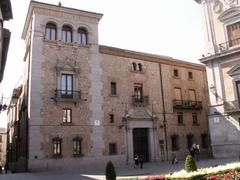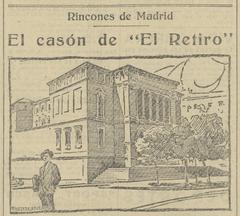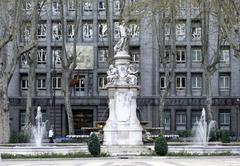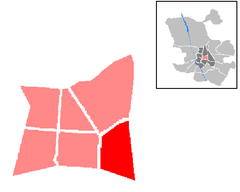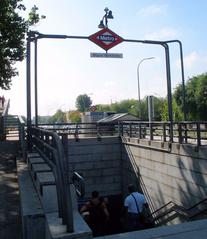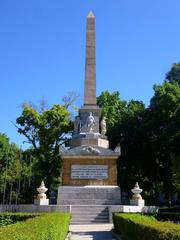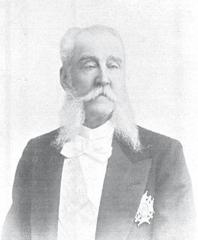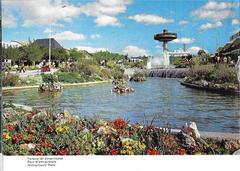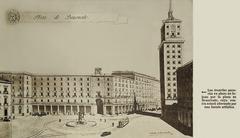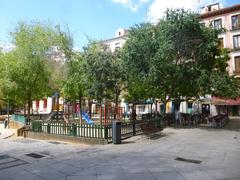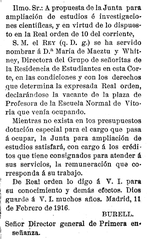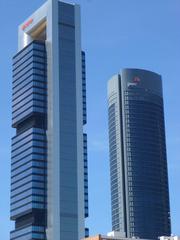Instituto Nacional de la Seguridad Social Visiting Guide
Publication Date: 17/07/2024
Introduction to Instituto Nacional de la Seguridad Social
The Instituto Nacional de la Seguridad Social (INSS) in Madrid, Spain, stands as a cornerstone of the Spanish social security system, centralizing and streamlining the administration of social security benefits. Established in 1978, the INSS was a pivotal initiative aimed at modernizing Spain’s fragmented social welfare system during the post-Franco era. Its creation marked a significant transition towards a more unified and comprehensive approach to social security, encapsulated within the legislative framework of the Spanish Constitution of 1978 and the General Law on Social Security of 1994 (INSS Official Website). Over the years, the INSS has expanded its services and embraced technological advancements to enhance efficiency and transparency, ensuring robust social protection for millions of Spanish citizens (El País). Located in the heart of Madrid, the INSS headquarters is easily accessible and offers a comprehensive range of services, including pension claims, health insurance, and unemployment benefits. This guide aims to provide visitors with essential information for a smooth and efficient visit, covering everything from operating hours and required documentation to nearby attractions and emergency contacts.
Table of Contents
- The Comprehensive History of Spain’s Instituto Nacional de la Seguridad Social (INSS)
- Essential Visitor Tips for the Instituto Nacional de la Seguridad Social in Madrid
The Comprehensive History of Spain’s Instituto Nacional de la Seguridad Social (INSS)
Establishment and Early Years
The Instituto Nacional de la Seguridad Social (INSS) was established in 1978 as part of Spain’s broader efforts to modernize and consolidate its social security system. The creation of the INSS was a significant milestone in the history of Spanish social welfare, marking the transition from a fragmented system of social insurance schemes to a more unified and comprehensive approach. The INSS was tasked with managing and administering the various benefits and services provided under Spain’s social security system, including pensions, disability benefits, and healthcare coverage.
Legislative Framework
The legislative framework that underpins the INSS is rooted in the Spanish Constitution of 1978, which enshrines the right to social security for all citizens. The General Law on Social Security (Ley General de la Seguridad Social) of 1994 further codified the principles and structures of the social security system, providing a detailed legal basis for the operations of the INSS. This law has been amended several times to adapt to changing social and economic conditions, but its core principles remain intact.
Expansion and Modernization
Throughout the 1980s and 1990s, the INSS underwent significant expansion and modernization. This period saw the introduction of new technologies and administrative practices aimed at improving the efficiency and effectiveness of the social security system. The INSS also expanded its range of services, introducing new benefits and programs to address emerging social needs. For example, the introduction of the non-contributory pension scheme in 1990 provided a safety net for individuals who had not accumulated sufficient contributions to qualify for a contributory pension.
Integration with European Systems
Spain’s accession to the European Union in 1986 had a profound impact on the INSS. As part of the process of European integration, Spain was required to harmonize its social security system with those of other EU member states. This involved adopting EU regulations on the coordination of social security systems, which ensure that individuals who move between EU countries do not lose their social security rights. The INSS played a key role in implementing these regulations, working closely with its counterparts in other EU countries to facilitate the coordination of benefits and services.
Recent Developments
In recent years, the INSS has continued to evolve in response to changing social and economic conditions. The global financial crisis of 2008 and the subsequent economic downturn had a significant impact on Spain’s social security system, leading to increased demand for benefits and services. The INSS responded by implementing a range of measures aimed at ensuring the sustainability of the system, including reforms to pension entitlements and contributions.
More recently, the COVID-19 pandemic has posed unprecedented challenges for the INSS. The pandemic has led to a surge in demand for social security benefits, particularly unemployment benefits and sickness benefits. The INSS has had to adapt rapidly to these challenges, introducing new measures to support individuals and families affected by the pandemic. For example, the introduction of the Minimum Vital Income (Ingreso Mínimo Vital) in 2020 provided a crucial lifeline for many households during the pandemic (El País).
Technological Innovations
The INSS has also embraced technological innovations to improve its services and operations. The introduction of digital platforms and online services has made it easier for individuals to access information and apply for benefits. The INSS has also implemented advanced data analytics and artificial intelligence tools to enhance its administrative processes and improve the accuracy and efficiency of benefit determinations. These technological innovations have been particularly important during the COVID-19 pandemic, enabling the INSS to continue providing services despite the challenges posed by social distancing and lockdown measures (INSS Official Website).
Social Impact
The INSS has had a profound impact on Spanish society, providing a crucial safety net for millions of individuals and families. The benefits and services administered by the INSS have helped to reduce poverty and inequality, improve health outcomes, and enhance the overall quality of life for many Spaniards. The INSS has also played a key role in promoting social cohesion and stability, particularly during times of economic and social upheaval.
Future Challenges
Looking ahead, the INSS faces a number of challenges. Demographic changes, including an aging population and declining birth rates, pose significant challenges for the sustainability of the social security system. The INSS will need to continue adapting its policies and practices to address these challenges, ensuring that it can continue to provide adequate benefits and services for future generations. Additionally, the ongoing digital transformation of the social security system will require continued investment in technology and innovation, as well as efforts to ensure that all individuals can access and benefit from digital services.
Visitor Information
For those looking to visit or interact with the INSS, here is some useful information:
- Contact Information:
- Phone: +34 901 16 65 65
- Email: [email protected]
- Official Website: INSS Official Website
- Office Locations: INSS offices are located throughout Spain. Major offices can be found in cities such as Madrid, Barcelona, Valencia, and Seville.
- Visiting Hours: Most INSS offices are open from 9:00 AM to 2:00 PM, Monday to Friday. It is advisable to check the specific visiting hours of the office you intend to visit on the official website.
Nearby Attractions
If you are visiting an INSS office, consider exploring nearby attractions. For example, the INSS office in Madrid is close to the Prado Museum, the Royal Palace, and Retiro Park. In Barcelona, the INSS office is near the Sagrada Família and Park Güell.
Conclusion
The history of the INSS is a testament to Spain’s commitment to social welfare and the principles of solidarity and social justice. From its establishment in 1978 to its ongoing efforts to adapt to changing social and economic conditions, the INSS has played a crucial role in shaping the social security landscape in Spain. As it looks to the future, the INSS will continue to face new challenges and opportunities, but its core mission of providing social protection and support for all citizens remains unchanged.
Frequently Asked Questions (FAQ)
What is the INSS?
The Instituto Nacional de la Seguridad Social (INSS) is the Spanish government agency responsible for managing and administering social security benefits, including pensions, disability benefits, and healthcare coverage.
How can I contact the INSS?
You can contact the INSS by phone at +34 901 16 65 65, by email at [email protected], or through their official website.
What services does the INSS provide?
The INSS provides a range of social security benefits and services, including pensions, disability benefits, healthcare coverage, unemployment benefits, and the Minimum Vital Income.
What are the visiting hours for INSS offices?
Most INSS offices are open from 9:00 AM to 2:00 PM, Monday to Friday. It is advisable to check the specific visiting hours of the office you intend to visit on the official website.
Essential Visitor Tips for the Instituto Nacional de la Seguridad Social in Madrid
Introduction
Planning a visit to the Instituto Nacional de la Seguridad Social (INSS) in Madrid? This guide will provide you with all the essential information you need for a smooth and efficient visit. From location and accessibility to required documentation and special events, we’ve got you covered.
Location and Accessibility
The Instituto Nacional de la Seguridad Social (INSS) is centrally located in Madrid, Spain, making it easily accessible by various modes of transportation. The main office is situated at Calle de los Astros, 5, 28007 Madrid. Visitors can reach the INSS via the Madrid Metro, with the closest station being “Sainz de Baranda” on lines 6 and 9. Additionally, several bus lines, including 15, 30, and 56, stop nearby, providing convenient access.
Operating Hours
The INSS operates from Monday to Friday, typically from 9:00 AM to 2:00 PM. It is advisable to arrive early, as the office can get crowded, especially on Mondays and Fridays. Note that the office is closed on weekends and public holidays. For the most up-to-date information on operating hours, visitors should check the official INSS website.
Required Documentation
When visiting the INSS, it is crucial to bring all necessary documentation to avoid multiple trips. Commonly required documents include:
- Identification: A valid passport or national ID card.
- Social Security Number: Proof of your social security number, which can be found on your social security card or previous correspondence from the INSS.
- Employment Records: Recent pay stubs, employment contracts, or any other documents that verify your employment status.
- Medical Records: If applicable, bring any medical records or certificates related to your social security claims.
For specific cases, additional documents may be required. It is recommended to consult the INSS documentation guidelines before your visit.
Language Assistance
While many staff members at the INSS speak English, it is beneficial to have a basic understanding of Spanish or bring a Spanish-speaking companion. For non-Spanish speakers, the INSS provides translation services, but it is advisable to request this service in advance. Additionally, visitors can use translation apps or hire a professional translator to ensure clear communication.
Appointment System
To minimize wait times, the INSS offers an appointment system. Visitors can book an appointment online through the INSS appointment portal. Booking an appointment is highly recommended, especially during peak times, to ensure a smoother and more efficient visit.
Services Offered
The INSS provides a wide range of services related to social security, including:
- Pension Claims: Assistance with applying for retirement, disability, and survivor pensions.
- Health Insurance: Information and registration for public health insurance.
- Maternity and Paternity Benefits: Guidance on applying for maternity and paternity leave benefits.
- Unemployment Benefits: Support for those seeking unemployment benefits and job-seeking assistance.
For a comprehensive list of services, visitors can refer to the INSS services page.
COVID-19 Protocols
As of July 2024, the INSS has implemented several COVID-19 safety measures to protect visitors and staff. These include:
- Mask Mandate: All visitors are required to wear masks inside the building.
- Social Distancing: Maintain a distance of at least 1.5 meters from others.
- Sanitization Stations: Hand sanitizing stations are available at the entrance and throughout the office.
- Temperature Checks: Temperature checks may be conducted at the entrance.
For the latest updates on COVID-19 protocols, visitors should check the INSS COVID-19 information page.
Nearby Amenities
The INSS office is located in a bustling area of Madrid, with several amenities nearby to enhance your visit:
- Cafes and Restaurants: Numerous cafes and restaurants are within walking distance, offering a variety of dining options.
- Pharmacies: Several pharmacies are located nearby for any medical needs.
- Public Parks: The Retiro Park, one of Madrid’s largest and most beautiful parks, is a short walk away, providing a perfect spot to relax before or after your visit.
Emergency Contacts
In case of an emergency during your visit to the INSS, it is important to have the following contact information readily available:
- Emergency Services: Dial 112 for police, fire, or medical emergencies.
- Local Police: The nearest police station is located at Calle de la Montera, 18, 28013 Madrid. Phone: +34 915 48 79 00.
- Medical Assistance: The nearest hospital is Hospital General Universitario Gregorio Marañón, located at Calle del Dr. Esquerdo, 46, 28007 Madrid. Phone: +34 915 86 80 00.
Additional Tips
- Dress Code: While there is no formal dress code, it is advisable to dress smartly and comfortably.
- Cash and Cards: Ensure you have some cash on hand, as not all services may accept card payments.
- Patience and Politeness: The INSS can be busy, and wait times may be longer than expected. Patience and politeness go a long way in ensuring a positive experience.
History and Cultural Significance
The Instituto Nacional de la Seguridad Social, established in the mid-20th century, plays a crucial role in Spain’s social welfare system. Over the years, it has evolved to provide comprehensive services that support the well-being of the Spanish population. Understanding its historical context can enhance your appreciation of the institution’s significance.
Special Events and Guided Tours
Occasionally, the INSS hosts special events and offers guided tours to provide deeper insights into its operations and services. These events are an excellent opportunity to learn more about Spain’s social security system. Check the INSS events page for upcoming events and tours.
Photographic Spots
For those looking to capture memories, the INSS building and its surroundings offer several good spots for photography. The architecture of the INSS combined with the nearby Retiro Park provides a picturesque backdrop for photos.
FAQ
Q: What are the visiting hours for the INSS?
A: The INSS is open from Monday to Friday, 9:00 AM to 2:00 PM.
Q: Do I need an appointment to visit the INSS?
A: While not mandatory, booking an appointment online is highly recommended to avoid long wait times.
Q: Are there any COVID-19 protocols in place?
A: Yes, masks are required, social distancing is enforced, and hand sanitizing stations are available.
Q: Is there language assistance available at the INSS?
A: Yes, translation services are available, but it is advisable to request this service in advance.
Conclusion
By following these tips and guidelines, visitors can ensure a smooth and efficient visit to the Instituto Nacional de la Seguridad Social in Madrid, Spain. For more detailed information, always refer to the official INSS website. Stay updated on new posts and helpful tips by downloading our mobile app Audiala and following us on social media.
Summary and Final Thoughts
The Instituto Nacional de la Seguridad Social (INSS) in Madrid has played a vital role in shaping Spain’s social security landscape since its establishment in 1978. Its evolution reflects Spain’s commitment to social welfare and the principles of solidarity and social justice. The INSS has continually adapted to changing social and economic conditions, implementing technological innovations and expanding its range of services to meet the needs of the Spanish populace. In recent years, it has faced unprecedented challenges, such as the global financial crisis and the COVID-19 pandemic, yet it has responded effectively with measures like the Minimum Vital Income (El País). As the INSS looks to the future, it will need to address ongoing challenges, including demographic shifts and the continued digital transformation of social security services. For visitors, understanding the history and significance of the INSS provides a deeper appreciation of Spain’s social security system and its impact on society. By following the guidelines and tips provided in this guide, visitors can ensure a smooth and efficient experience at the INSS headquarters in Madrid.
Sources and Further Reading
- El País (2020). El gobierno aprueba el ingreso mínimo vital. https://elpais.com/espana/2020-05-29/el-gobierno-aprueba-el-ingreso-minimo-vital.html
- INSS Official Website. (n.d.). Instituto Nacional de la Seguridad Social. https://www.seg-social.es/wps/portal/wss/internet/Inicio









